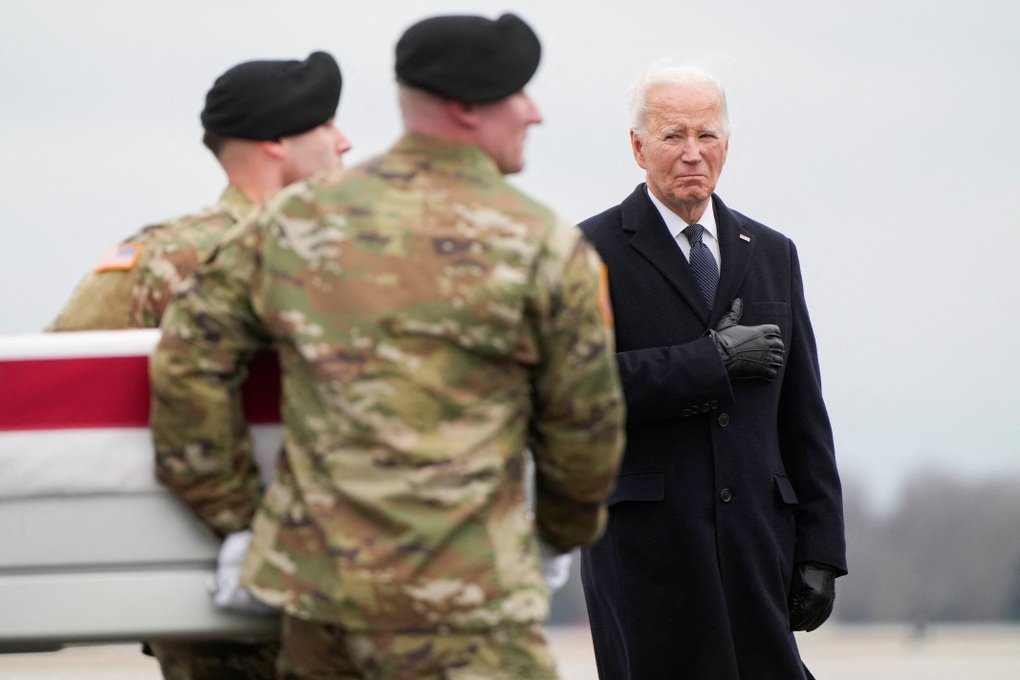
President Biden’s difficult position in the `pan of fire` in the Middle East
(Dan Tri) – The United States is simultaneously facing a series of difficult problems in the Middle East, from the conflict between Israel and Hamas to Houthi attacks in the Red Sea, as well as threats to US soldiers in the Middle East.
US President Joe Biden attended the transfer ceremony of the remains of three US soldiers who died in Jordan at Dover Air Force Base in Dover, Delaware, USA on February 2 (Photo: Reuters).
During nearly the first three years of President Joe Biden’s term, the US did not focus on the Middle East region.
`In the Middle East, we strive to increase our ability to contain Iran, help de-escalate regional conflicts, increase integration with diverse groups of partners in the region, and promote energy stability.
Initially, it seemed that President Biden’s administration was on the right track.
However, Hamas’ attack on Israel on October 7, 2023 and subsequent developments ruined everything.
`The US cannot do everything. They are too spread out. They need to choose one or two fronts, but they cannot pursue all three at the same time,` said Mr. Firas Modad, a Middle East expert who
Constant challenge
The war between Israel and Hamas has posed many difficult problems for President Biden’s administration.
However, the conflict in Gaza is only part of the problem.
Under the pretext of supporting the Palestinian people, Houthi forces in Yemen have launched a campaign to attack ships passing through the Red Sea, from cargo ships to even US warships.
On January 28, three US soldiers died and more than 30 others were injured after a US base in Jordan was attacked by drones.
Expert Modad believes that President Biden’s Middle East policy has failed, partly due to the legacy of what the US has done in the past 20 years.
Public opinion polls show that many US moves in the Middle East are unpopular with people in the region.
In addition, Mr. Modad also said that US policy has pushed China, Russia and Iran closer together.
Iranian Navy Commander Shahram Irani said on February 5 that the three countries will conduct joint naval exercises in the coming months, Tehran Times reported.
`The US military is very technologically advanced, but the Iranians have found cheap and effective ways to deal with America’s technological superiority,` Mr. Modad said.
Halfway policy

Palestinians gathered at the site of an Israeli attack on a residential building in Rafah in the southern Gaza Strip on February 4 (Photo: Reuters).
Up to now, the US’s moves have mainly been in response to developments on the ground, and have largely failed to completely resolve the situation.
The US continues its policy of supporting Israel in the conflict with Hamas.
US officials have stepped up calls for the parties to reach a diplomatic solution, as well as announced a visa ban on a number of Israeli individuals believed to have committed acts `harmful to peace, security and stability.`
In the Red Sea, the US and a number of allies and partners established an alliance in December 2023 to deal with the actions of the Houthis.
Although the initial US announcement said France, Italy and Spain joined the alliance, the three European countries soon confirmed that their ships would not be under US command.
Meanwhile, in response to attacks by armed groups believed to have ties to Iran across the region, the US responded relatively cautiously.
On February 2, the US military simultaneously launched airstrikes on 85 targets in Iraq and Syria in retaliation for the previous deaths of three US soldiers in Jordan.
However, the Biden administration has ignored calls for direct attacks on Iranian forces, although the `hawks` still promote this effort after the attack on US soldiers.
Unlike Mr. Modad, former US Deputy Defense Secretary Dov Zakheim believes that the US needs to play a role in Europe, East Asia and the Middle East.
According to Mr. Zakheim, to be able to balance the above three priorities, the US has no choice but to increase the defense budget.
`Unless the US wants to let the Middle East fall into Iran’s hands, Washington will have to face an unpleasant reality: They must quickly significantly increase defense spending. This can be difficult in the political context.


